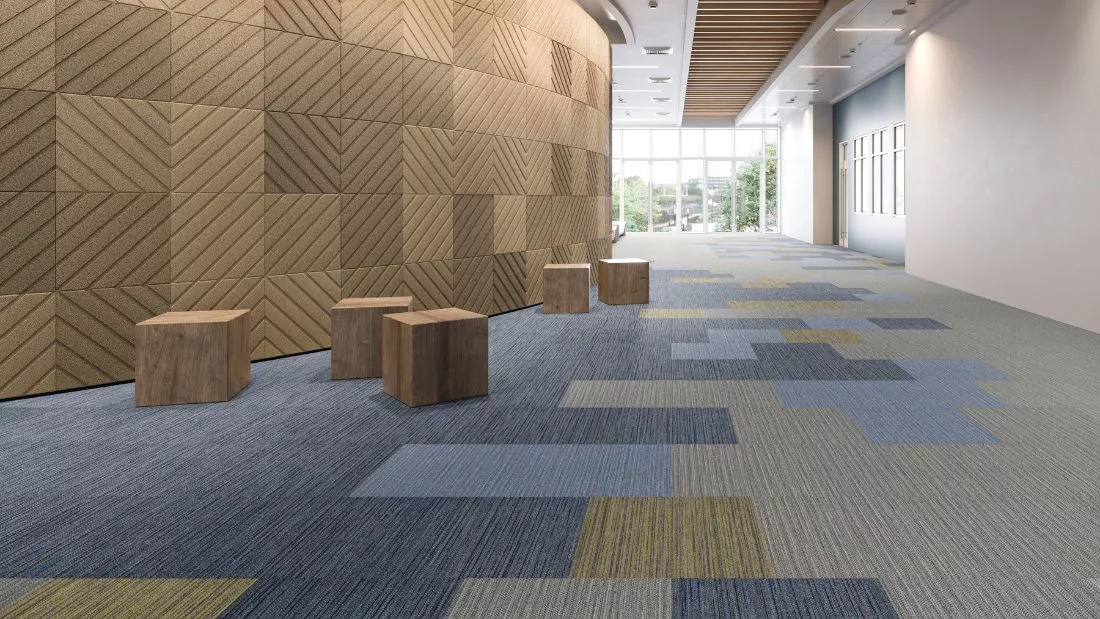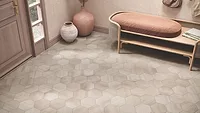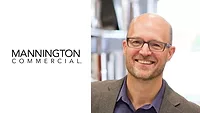An Inside Look at Mannington Commercial's Newest Sustainability Initiatives

New Composition is Green Label Plus certified as low-emitting for better indoor air quality. The flooring contains recycled content, is 100 percent recyclable, and features an HPD and EPD for total transparency. Photo: Mannington Commercial
Mannington Commercial has been making strategic moves to drive meaningful environmental change on a broad scale.
Beginning in 2023, the company began offsetting an equivalent 105% of the cradle-to-gate embodied carbon from all its domestically manufactured commercial products. It recently announced that it signed onto the United Nations Global Compact (UNGC), demonstrating its commitment to advancing best practices concerning human rights, labor, the environment and anti-corruption. In addition, the company partnered with Appalachian Carbon Exchange (ACE), a non-profit initiative of the Tennessee River Gorge Trust, as its carbon offset partner. Mannington Commercial also joined a national roster of organizations dedicated to recovery, recycling and reuse of building materials in the United States.
FLOOR Trends & Installation connected with Shane Totten, AIA, Mannington Commercial's director of sustainability, to learn more about these initiatives.
 Shane Totten, AIA, Mannington Commercial's director of sustainability.
Shane Totten, AIA, Mannington Commercial's director of sustainability. FLOOR Trends & Installation: Tell us about the United Nations Global Compact.
Shane Totten: We have joined the United Nations Global Compact. That is recognized as one of the largest corporate sustainability initiatives in existence today. It is managed by the United Nations, and it has an intense focus on global best business practices around human rights, labor, the environment, and anti-corruption. There are 10 principles that you're adhering to, or that you're supporting. Within each of those are four pillars of priorities.
We undertook a self-assessment at the end of last year, beginning of this year, with our C-suite and our board to go through and really assess where we stood against those recognized best practices. I was excited that of the 36 metrics, or 36 evaluation areas, we are aligning on 31 of those. I think that is by and large due to the fact that we are a family-owned business and that we really take seriously our commitment to our values of caring, doing the right thing, controlling our own destiny, and working hard and playing hard.
FLOOR Trends & Installation: How do you determine your sustainability priorities as a company?
Totten: People are first and foremost, but people exist within the built and natural environment. And so, if you underserved the built and natural environment, you underserved the people there. The way I approach environmental and social responsibility at Mannington is people first. And that's not a slogan or anything, but I really look at how does what we do—we're in the business of making things—how does that impact people's lives? Not just our customers, but our associates. How do we elevate their experience, their careers, their families, the communities they live in? Through the work that we do, through the impact that we have and the way that we can leverage our influence, the way we can leverage edge our decisions is really important. We really lead with caring about people.
FLOOR Trends & Installation: Tell us about your recent partnership with the Appalachian Carbon Exchange.
Totten: We have a five-year partnership with the Appalachian Carbon Exchange located in Chattanooga. They are a small, brand-new nonprofit. They came out of the Tennessee River Gorge Trust, which is a 45-year-old nonprofit in Chattanooga that protects the Tennessee River Gorge that runs through the city. They got into the carbon market, the carbon credit game, because they saw an opportunity to take corporate carbon offset dollars and do something real with them in communities by reinvesting those dollars into family-owned, locally-owned, nonprofit-owned lands that were not otherwise protected. They are creating a revenue stream that helps those families or those organizations. It's having real material impact in those communities by creating jobs, by preserving the land for a minimum of 60 years by creating recreation opportunities, by creating watershed protection, habitat protection.
And as we were looking at the offset program, there are two things that are really important to me. Our carbon offsets do not change a thing about our business. They are an immediate investment in our future. They are our ability to do the right thing and to demonstrate our care to core values by investing in those carbon credits so that we can have an impact today on the climate crisis. We can prevent the release of carbon dioxide today, which is incredibly important because of the compounding effect of carbon dioxide. We know it's an equivalent.
The other piece is that we have to reduce our absolute emissions, and we're working hard on that. We have a weight-loss program for several of our products that'll be coming out next year. And what that means is we're changing the construction to reduce the amount of content in those products without sacrificing the performance.
We’re also undertaking energy audits at all of our plants. We're looking at net zero waste next year and how we're going to achieve that. So, there's the carbon offsets, which some people might say is a feel-good thing, some people might say it's greenwashing because you're not really changing your business, but what we say is, no—we're making a difference today. And we're choosing to do that in communities close to or where our families, our associates, live and they work and they pray and they play and they go to school.
FLOOR Trends & Installation: What about product circularity?
Totten: Our partnership with Build Reuse is an important step in our ongoing commitment to taking a holistic approach to our environmental stewardship. With Build Reuse, we’re pursuing circularity and the need to find responsible end-of-life solutions for our products.
It is a national network of organizations, local organizations across the country, who recover existing building materials. These are materials that are in existing buildings. They will uninstall, disassemble them, they will transport them, and they will make them available for reuse. They're either for purchase or for donation depending on the organization. As we're wrestling with reclamation, recycling end-of-life solutions, we're really committed to doing things that advance circular practices. We all talk about circularity, and then you find out that a company's reclamation program is just sending everything to incineration for energy. That's not circularity. That's your eliminating the entire potential of material to serve another purpose other than momentary heat. But it's hard. It's complicated.
Recycling infrastructure is lacking across the country. Reclamation practices are lacking across the country, and we are in that boat. I am not pointing a finger at anybody that I'm not willing to point at ourselves, but reuse is a viable option. And so, we want to add that to our quiver, in what we can offer our customers and end users to keep stuff out of the landfill. We sponsoring them to elevate them and increase their capacity to increase their workforce development potential for uninstalling, disassembling buildings, which is a big push from the American Institute of Architects.
Looking for a reprint of this article?
From high-res PDFs to custom plaques, order your copy today!



